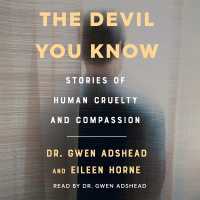Full Description
"The Siracusa Guidelines have appeared at an important and opportune moment. Those keen to promote accountability in conflicts around the world are increasingly relying on fact finding bodies to provide necessary documentation which will ensure that those responsible for human rights abuses are brought to justice. The 'Guidelines', developed from inputs by more than 80 experts, provide a thorough and welcome framework to ensure clarity and consistency throughout the processes of creating, investigating, reporting and follow-up for these various bodies." Karen Koning AbuZayd Commissioner, Syria UN CoI; Former High Commissioner UNRWA "The Siracusa Guidelines for fact-finding bodies derive from a wealth of combined knowledge and experience in the field. They address in a comprehensive and integrated way many essential issues which have often been inadequately dealt with or ignored. The application of the guidelines will not only improve the conduct and effectiveness of such missions but also enhance their legitimacy."
Philippe Kirsch Former President, ICC; Former Ambassador and Legal Adviser, MOFA, Canada "Fact-Finding Bodies are an essential component of international, regional and national investigative processes. It is of paramount concern that they work to high and common standards. The obvious expertise and solid work of the Siracusa Committee has produced a draft of high quality, and of great practical application." Howard Morrison Judge, ICC; Former Judge, ICTY "These Guidelines are indispensable to those engaged in fact-finding and will contribute immensely to the process of international criminal justice." Hassan B. Jallow Chief Prosecutor, UNICTR/UNMICT "These guidelines are an essential resource for anybody working on issues connected with international investigation commissions in the future." Serge Brammertz Prosecutor, ICTY "Hindsight, Insight and Foresight...These Guidelines provide a wealth of wisdom for discussion and reflection." Vitit Muntarbhorn Professor of Law, Bangkok University; international human rights expert who served in several UN capacities
Contents
Part I: Identification of Issues in Relation to UN FactFinding Mechanisms Introduction International Commissions of Inquiry - Methods and Costs of COIs Special Procedures - Methods and Costs of Special Procedures Treaty Bodies - Methods and Costs of the Treaty Body System De-facto Fact-Finding Missions Undertaken by the UN Department of Peacekeeping Operations (DPKO) National Fact-Finding Bodies Conclusion Part II: The Siracusa Guidelines Part III: An Empirical Analysis of United Nations Commissions of Inquiry: Toward the Development of a Standardized Methodology Abstract Introduction UN Monitoring, Reporting and Fact-Finding Activities Methods Results - Mandates - State Consent - Prior and Simultaneous Investigations - Terms of Reference - Facts Alleged and Conclusions Reached - Investigative Methodology - Commissioners and Mission Personnel - Witnesses, Victims and Detainees - The Role of Non-Governmental Organizations - Recommendations and Follow-up - Budgets and Resource Allocation Discussion on the Challenges in Implementing and Facilitating Fact-Finding Missions - Mandates and Terms of Reference - Lack of Standardized Methodology Guiding Fact-Finding Missions - Commissioners and Personnel - Witnesses, Victims and Detainees - The Role of NGOs and Members of Civil Society - Budgets and Resource Allocation Implications for Best Practice in Fact-Finding Missions - Mandates - Appointment of Commissioners and Hiring of Mission Personnel - Terms of Reference - Investigative Methodology and Report Compilation - Recommendations Regarding Witnesses and Victims - Recommendations Regarding Budgets and Resource Allocation Limitations of the Study Appendices to the Empirical Analysis of United Nations Commissions of Inquiry Reports Evaluated in Sample - Quantitative Variables - Operationalization of Quantitative Variables- Thematic Guiding Questions for Qualitative Review UN Documents UN General Assembly Resolution 67/1 - Report of the UN Secretary-General on Delivering Justice: Programme of Action to Strengthen the Rule of Law at the National and International Level - Statement of the UN Secretary-General at the High-Level Meeting of the General Assembly on the Rule of Law, 24 September 2012 - Statement of ISISC President, Professor M. Cherif Bassiouni, at the High-Level Meeting of the General Assembly on the Rule of Law, 24 September 2012








